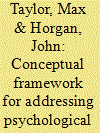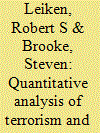| Srl | Item |
| 1 |
ID:
074607


|
|
|
|
|
| Publication |
2006.
|
| Summary/Abstract |
In political disputes, issue frames set parameters for debate and shape which view dominates. This study expands issue framing research to examine the influence of frames on the perception of future terrorist threats as well as subsequent support for related counterterrorism policies. We test several hypotheses using data from an experimental field poll. We find that issue frames clearly influence perceptions of threat. However, our frames, which posit specific terrorism threats, only have a limited influence on respondent preferences for counter-terrorism policies. We consider a variety of explanations for these results and provide direction for future research.
|
|
|
|
|
|
|
|
|
|
|
|
|
|
|
|
| 2 |
ID:
074608


|
|
|
|
|
| Publication |
2006.
|
| Summary/Abstract |
A conceptual framework is presented for addressing psychological issues in the development of the terrorist. In particular, the authors suggest that viewing terrorism as a process may lead not only to better conceptual development in analyses of the terrorist, but may also lead to the development of more practical and efficient counterterrorism initiatives. Additionally, viewing terrorism in this way may finally lead to the formation of a clear and unambiguous position for psychology within an interdisciplinary approach to analyses of both terrorism and the terrorist.
|
|
|
|
|
|
|
|
|
|
|
|
|
|
|
|
| 3 |
ID:
074605


|
|
|
|
|
| Publication |
2006.
|
| Summary/Abstract |
This article uses immigration and other biographical data to refute much of the conventional wisdom about the relationship between terrorism and immigration. Using a database created from the biographical data of 373 terrorists, we have established a number of significant findings. Over forty percent of our database is made up of Western Nationals. Second, despite widespread alarms raised over terrorist infiltration from Mexico, we found no terrorist presence in Mexico and no terrorists who entered the U.S. from Mexico. Third, we found a sizeable terrorist presence in Canada and a number of Canadian-based terrorists who have entered the U.S. In addition to illuminating the terrorist networks entrenched in the West, this paper is also an attempt to advance the field of terrorism studies by taking a quantitative approach to data analysis.
|
|
|
|
|
|
|
|
|
|
|
|
|
|
|
|
| 4 |
ID:
074606


|
|
|
|
|
| Publication |
2006.
|
| Summary/Abstract |
Arab media is no longer limited to state-sponsored sources, opening a door of opportunity to the Muslim world. Islamic terrorist groups leverage information technology to form resilient, networked organizations that influence how many Muslims perceive events and U.S. political goals. This article looks at the connection between information technology and cultural transformation in the Middle East. It focuses on how information technology-as the major weapon system in the battle of ideas-has been used effectively by Islamic extremists and less so by the U.S. Important conclusions are drawn regarding the necessity of culturally-attuned uses of information technology.
|
|
|
|
|
|
|
|
|
|
|
|
|
|
|
|
| 5 |
ID:
074604


|
|
|
|
|
| Publication |
2006.
|
| Summary/Abstract |
This study tackles the as yet unaddressed question of the various types of factors related to victims of terrorism. We have explored core assumptions of terrorism and victimization theories by empirically testing both the randomness and the lifestyle-exposure theories. Specifically, we looked at how characteristics of victims of suicide bombings differ from the characteristics of those who have been casualties of other types of terrorism. Findings obtained via logistic regressions clearly refute the randomness hypothesis that the risk of victimization from terrorism is similar across all segments of society. Furthermore, findings indicate that victimization from suicide vis-à-vis other types of terrorism is related to the basics of lifestyle-exposure theories.
|
|
|
|
|
|
|
|
|
|
|
|
|
|
|
|